Report: The Effects of Mediterranean Diet on Obesity and Health
VerifiedAdded on 2022/08/21
|12
|2800
|24
Report
AI Summary
This report, based on secondary research, investigates the impact of the Mediterranean diet on obesity. The study highlights the growing prevalence of obesity and its associated health risks, emphasizing the importance of dietary behavior. The report explores the effectiveness of the Mediterranean diet in managing and preventing obesity, drawing from several studies. These studies suggest that adherence to the Mediterranean diet is associated with decreased body weight, improved metabolic health, and positive changes in the gut microbiome. The findings indicate that a diet rich in fruits, vegetables, and legumes can significantly reduce the likelihood of developing obesity and its related health complications. This report concludes that the Mediterranean diet serves as a beneficial dietary approach for weight management, improving lipid levels and controlling blood glucose levels.

Running head: REPORT
Nutrition
Name of the Student
Name of the University
Author Note
Nutrition
Name of the Student
Name of the University
Author Note
Paraphrase This Document
Need a fresh take? Get an instant paraphrase of this document with our AI Paraphraser
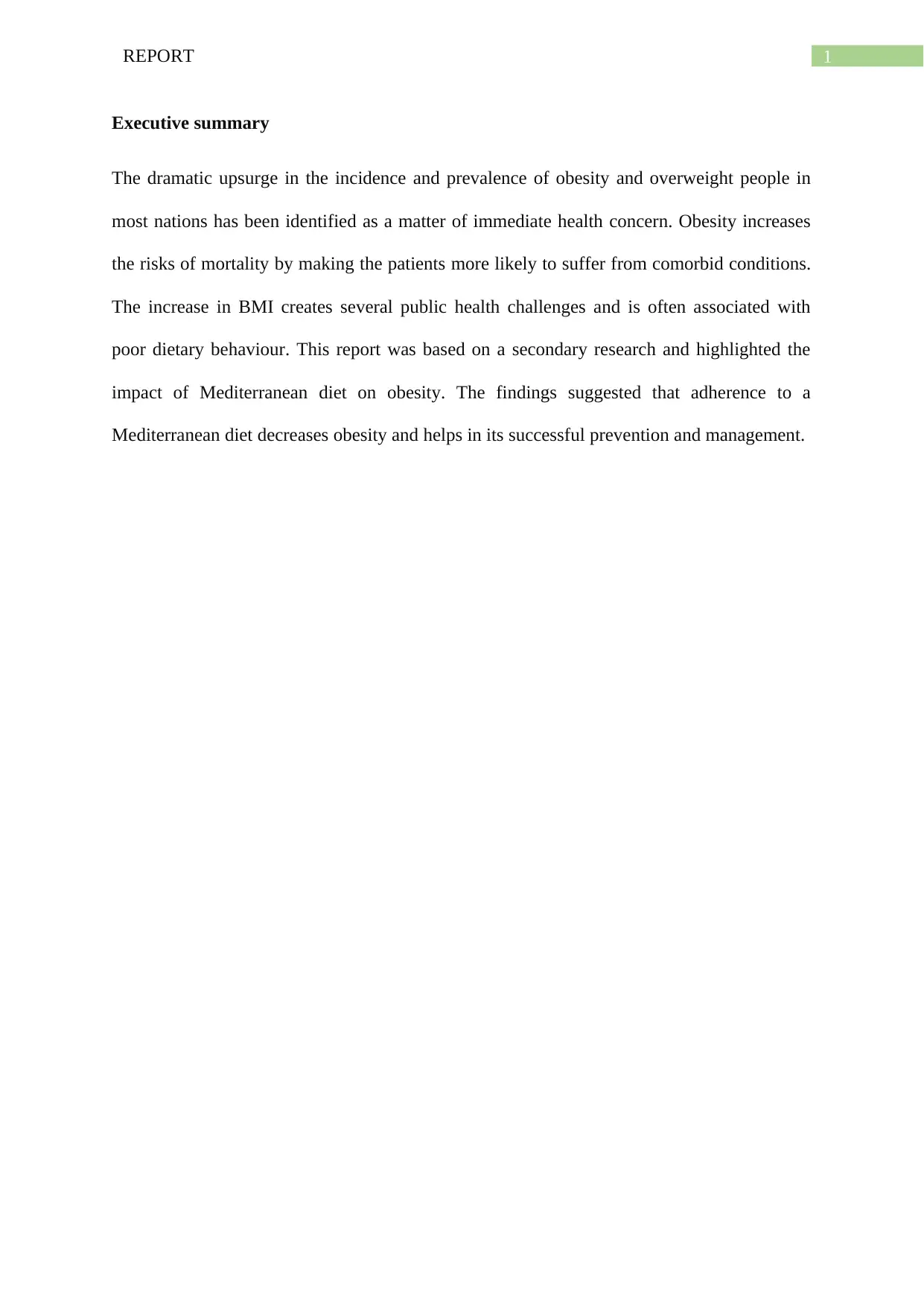
1REPORT
Executive summary
The dramatic upsurge in the incidence and prevalence of obesity and overweight people in
most nations has been identified as a matter of immediate health concern. Obesity increases
the risks of mortality by making the patients more likely to suffer from comorbid conditions.
The increase in BMI creates several public health challenges and is often associated with
poor dietary behaviour. This report was based on a secondary research and highlighted the
impact of Mediterranean diet on obesity. The findings suggested that adherence to a
Mediterranean diet decreases obesity and helps in its successful prevention and management.
Executive summary
The dramatic upsurge in the incidence and prevalence of obesity and overweight people in
most nations has been identified as a matter of immediate health concern. Obesity increases
the risks of mortality by making the patients more likely to suffer from comorbid conditions.
The increase in BMI creates several public health challenges and is often associated with
poor dietary behaviour. This report was based on a secondary research and highlighted the
impact of Mediterranean diet on obesity. The findings suggested that adherence to a
Mediterranean diet decreases obesity and helps in its successful prevention and management.
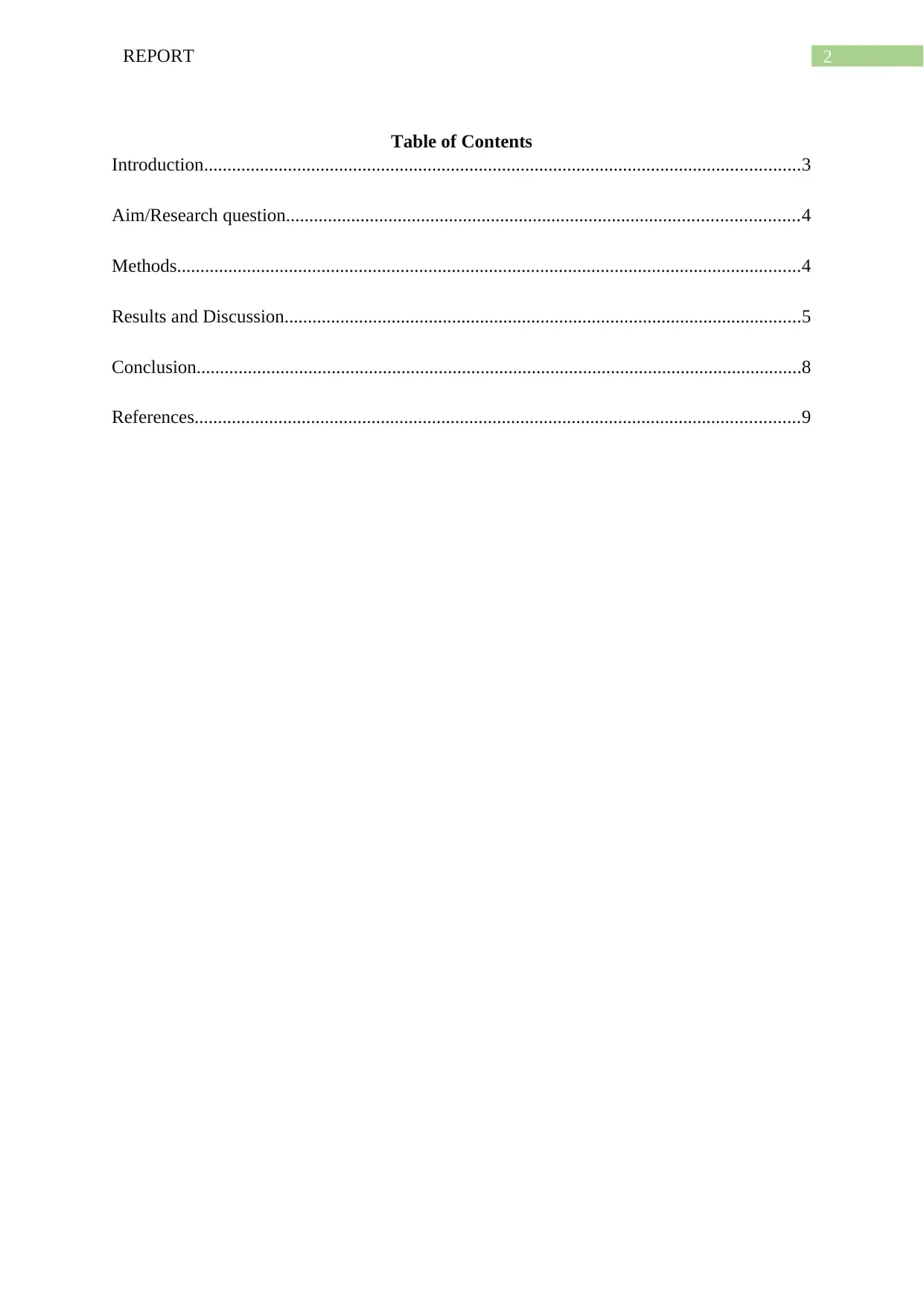
2REPORT
Table of Contents
Introduction................................................................................................................................3
Aim/Research question..............................................................................................................4
Methods......................................................................................................................................4
Results and Discussion...............................................................................................................5
Conclusion..................................................................................................................................8
References..................................................................................................................................9
Table of Contents
Introduction................................................................................................................................3
Aim/Research question..............................................................................................................4
Methods......................................................................................................................................4
Results and Discussion...............................................................................................................5
Conclusion..................................................................................................................................8
References..................................................................................................................................9
⊘ This is a preview!⊘
Do you want full access?
Subscribe today to unlock all pages.

Trusted by 1+ million students worldwide
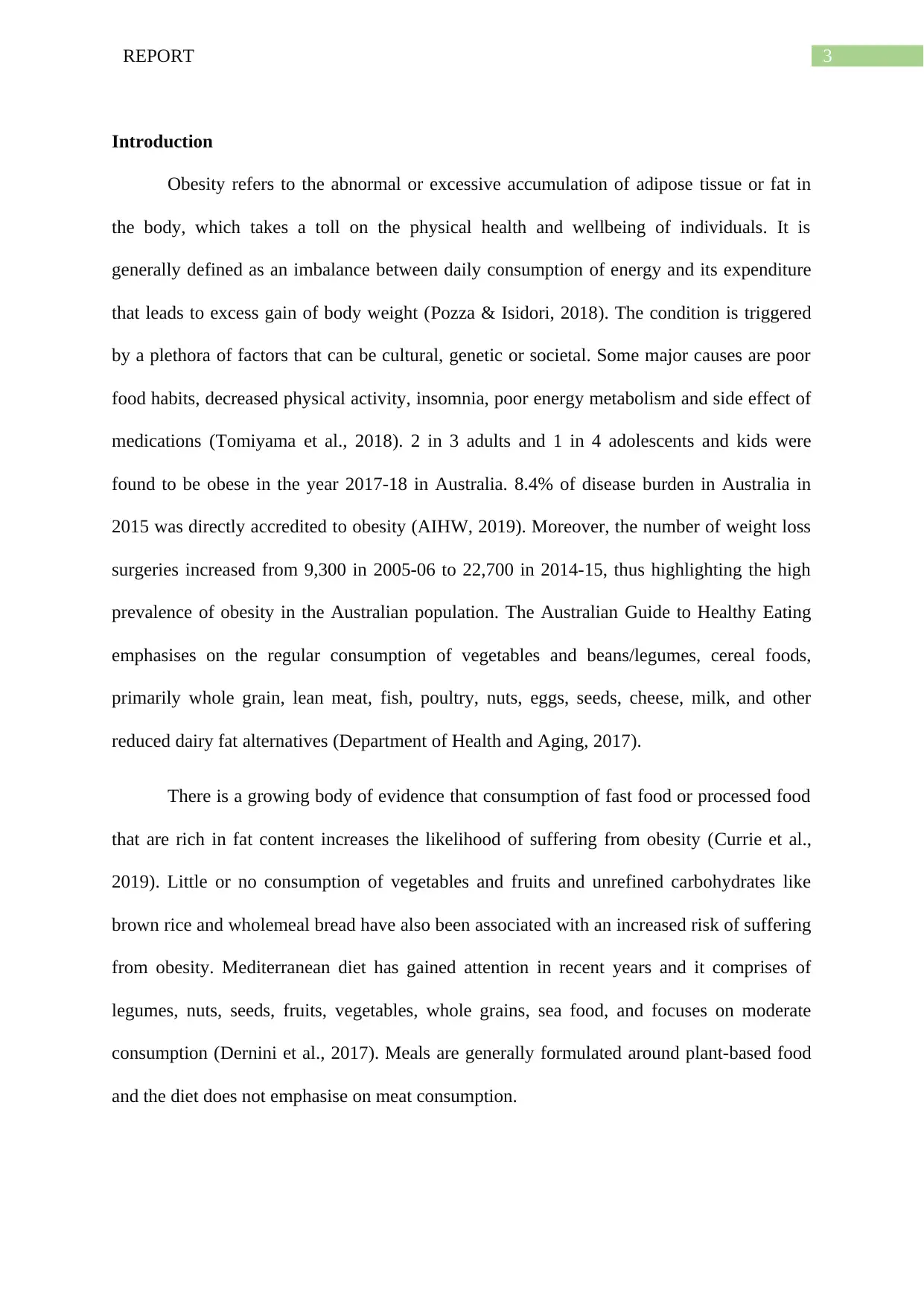
3REPORT
Introduction
Obesity refers to the abnormal or excessive accumulation of adipose tissue or fat in
the body, which takes a toll on the physical health and wellbeing of individuals. It is
generally defined as an imbalance between daily consumption of energy and its expenditure
that leads to excess gain of body weight (Pozza & Isidori, 2018). The condition is triggered
by a plethora of factors that can be cultural, genetic or societal. Some major causes are poor
food habits, decreased physical activity, insomnia, poor energy metabolism and side effect of
medications (Tomiyama et al., 2018). 2 in 3 adults and 1 in 4 adolescents and kids were
found to be obese in the year 2017-18 in Australia. 8.4% of disease burden in Australia in
2015 was directly accredited to obesity (AIHW, 2019). Moreover, the number of weight loss
surgeries increased from 9,300 in 2005-06 to 22,700 in 2014-15, thus highlighting the high
prevalence of obesity in the Australian population. The Australian Guide to Healthy Eating
emphasises on the regular consumption of vegetables and beans/legumes, cereal foods,
primarily whole grain, lean meat, fish, poultry, nuts, eggs, seeds, cheese, milk, and other
reduced dairy fat alternatives (Department of Health and Aging, 2017).
There is a growing body of evidence that consumption of fast food or processed food
that are rich in fat content increases the likelihood of suffering from obesity (Currie et al.,
2019). Little or no consumption of vegetables and fruits and unrefined carbohydrates like
brown rice and wholemeal bread have also been associated with an increased risk of suffering
from obesity. Mediterranean diet has gained attention in recent years and it comprises of
legumes, nuts, seeds, fruits, vegetables, whole grains, sea food, and focuses on moderate
consumption (Dernini et al., 2017). Meals are generally formulated around plant-based food
and the diet does not emphasise on meat consumption.
Introduction
Obesity refers to the abnormal or excessive accumulation of adipose tissue or fat in
the body, which takes a toll on the physical health and wellbeing of individuals. It is
generally defined as an imbalance between daily consumption of energy and its expenditure
that leads to excess gain of body weight (Pozza & Isidori, 2018). The condition is triggered
by a plethora of factors that can be cultural, genetic or societal. Some major causes are poor
food habits, decreased physical activity, insomnia, poor energy metabolism and side effect of
medications (Tomiyama et al., 2018). 2 in 3 adults and 1 in 4 adolescents and kids were
found to be obese in the year 2017-18 in Australia. 8.4% of disease burden in Australia in
2015 was directly accredited to obesity (AIHW, 2019). Moreover, the number of weight loss
surgeries increased from 9,300 in 2005-06 to 22,700 in 2014-15, thus highlighting the high
prevalence of obesity in the Australian population. The Australian Guide to Healthy Eating
emphasises on the regular consumption of vegetables and beans/legumes, cereal foods,
primarily whole grain, lean meat, fish, poultry, nuts, eggs, seeds, cheese, milk, and other
reduced dairy fat alternatives (Department of Health and Aging, 2017).
There is a growing body of evidence that consumption of fast food or processed food
that are rich in fat content increases the likelihood of suffering from obesity (Currie et al.,
2019). Little or no consumption of vegetables and fruits and unrefined carbohydrates like
brown rice and wholemeal bread have also been associated with an increased risk of suffering
from obesity. Mediterranean diet has gained attention in recent years and it comprises of
legumes, nuts, seeds, fruits, vegetables, whole grains, sea food, and focuses on moderate
consumption (Dernini et al., 2017). Meals are generally formulated around plant-based food
and the diet does not emphasise on meat consumption.
Paraphrase This Document
Need a fresh take? Get an instant paraphrase of this document with our AI Paraphraser
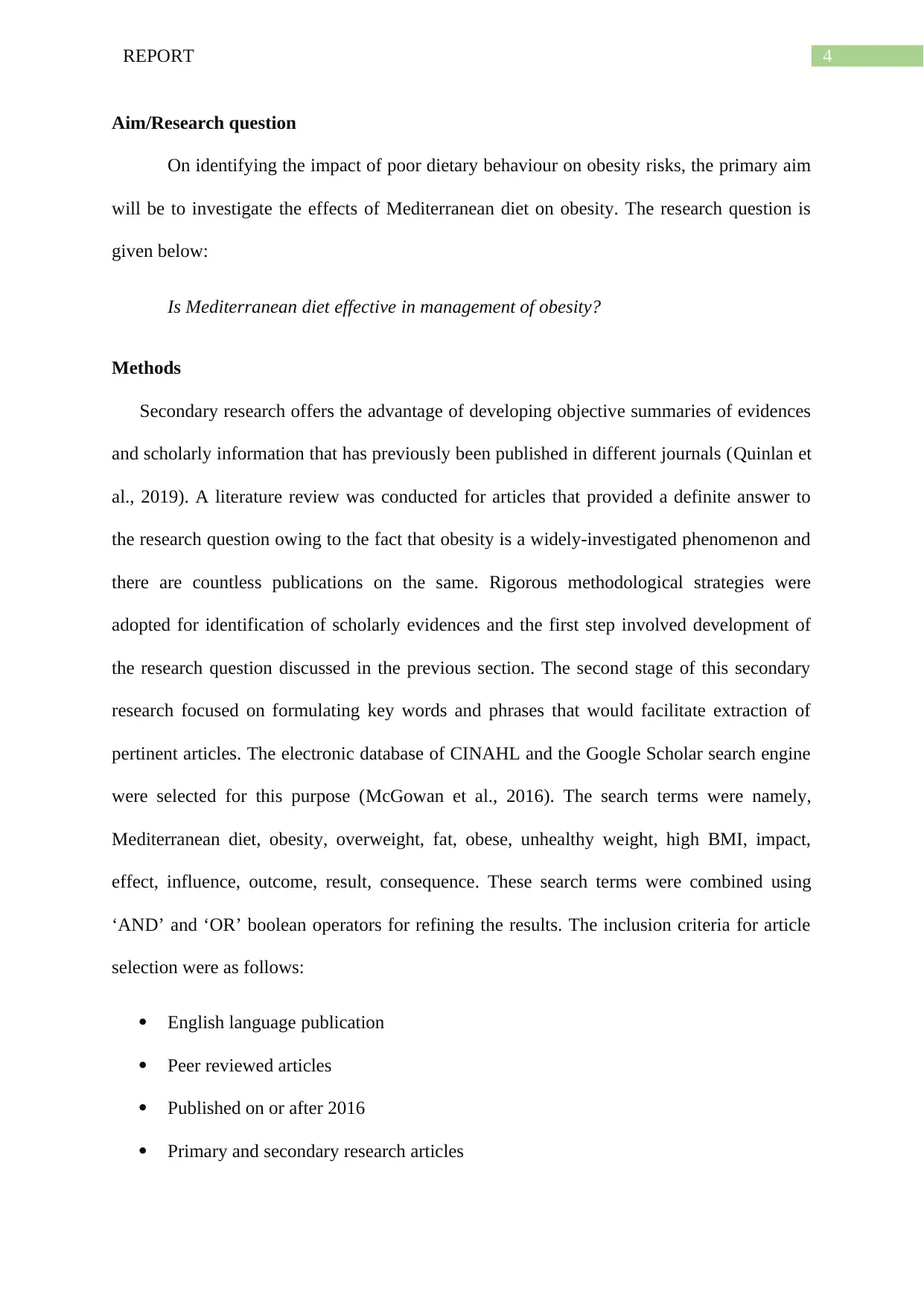
4REPORT
Aim/Research question
On identifying the impact of poor dietary behaviour on obesity risks, the primary aim
will be to investigate the effects of Mediterranean diet on obesity. The research question is
given below:
Is Mediterranean diet effective in management of obesity?
Methods
Secondary research offers the advantage of developing objective summaries of evidences
and scholarly information that has previously been published in different journals (Quinlan et
al., 2019). A literature review was conducted for articles that provided a definite answer to
the research question owing to the fact that obesity is a widely-investigated phenomenon and
there are countless publications on the same. Rigorous methodological strategies were
adopted for identification of scholarly evidences and the first step involved development of
the research question discussed in the previous section. The second stage of this secondary
research focused on formulating key words and phrases that would facilitate extraction of
pertinent articles. The electronic database of CINAHL and the Google Scholar search engine
were selected for this purpose (McGowan et al., 2016). The search terms were namely,
Mediterranean diet, obesity, overweight, fat, obese, unhealthy weight, high BMI, impact,
effect, influence, outcome, result, consequence. These search terms were combined using
‘AND’ and ‘OR’ boolean operators for refining the results. The inclusion criteria for article
selection were as follows:
English language publication
Peer reviewed articles
Published on or after 2016
Primary and secondary research articles
Aim/Research question
On identifying the impact of poor dietary behaviour on obesity risks, the primary aim
will be to investigate the effects of Mediterranean diet on obesity. The research question is
given below:
Is Mediterranean diet effective in management of obesity?
Methods
Secondary research offers the advantage of developing objective summaries of evidences
and scholarly information that has previously been published in different journals (Quinlan et
al., 2019). A literature review was conducted for articles that provided a definite answer to
the research question owing to the fact that obesity is a widely-investigated phenomenon and
there are countless publications on the same. Rigorous methodological strategies were
adopted for identification of scholarly evidences and the first step involved development of
the research question discussed in the previous section. The second stage of this secondary
research focused on formulating key words and phrases that would facilitate extraction of
pertinent articles. The electronic database of CINAHL and the Google Scholar search engine
were selected for this purpose (McGowan et al., 2016). The search terms were namely,
Mediterranean diet, obesity, overweight, fat, obese, unhealthy weight, high BMI, impact,
effect, influence, outcome, result, consequence. These search terms were combined using
‘AND’ and ‘OR’ boolean operators for refining the results. The inclusion criteria for article
selection were as follows:
English language publication
Peer reviewed articles
Published on or after 2016
Primary and secondary research articles
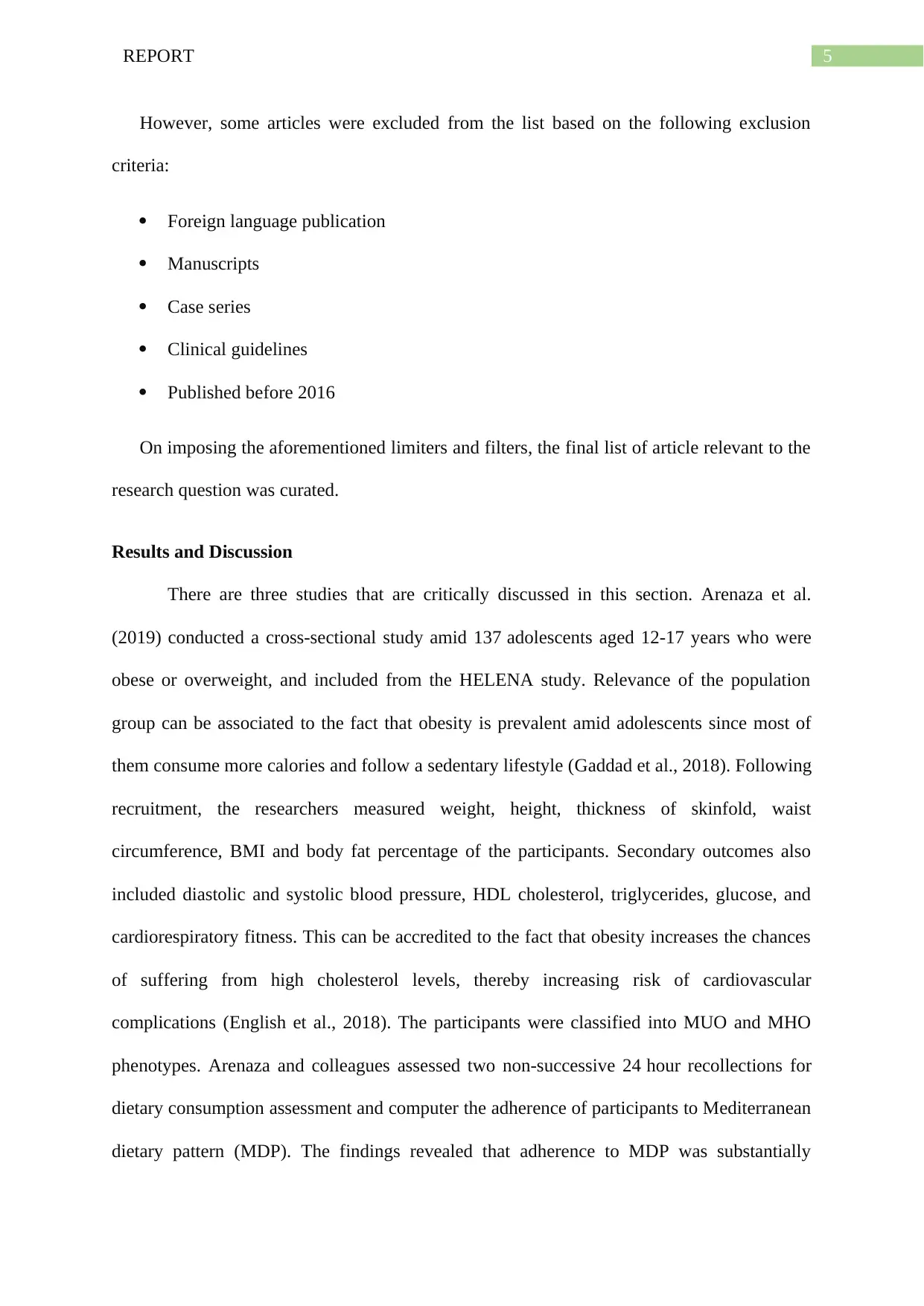
5REPORT
However, some articles were excluded from the list based on the following exclusion
criteria:
Foreign language publication
Manuscripts
Case series
Clinical guidelines
Published before 2016
On imposing the aforementioned limiters and filters, the final list of article relevant to the
research question was curated.
Results and Discussion
There are three studies that are critically discussed in this section. Arenaza et al.
(2019) conducted a cross-sectional study amid 137 adolescents aged 12-17 years who were
obese or overweight, and included from the HELENA study. Relevance of the population
group can be associated to the fact that obesity is prevalent amid adolescents since most of
them consume more calories and follow a sedentary lifestyle (Gaddad et al., 2018). Following
recruitment, the researchers measured weight, height, thickness of skinfold, waist
circumference, BMI and body fat percentage of the participants. Secondary outcomes also
included diastolic and systolic blood pressure, HDL cholesterol, triglycerides, glucose, and
cardiorespiratory fitness. This can be accredited to the fact that obesity increases the chances
of suffering from high cholesterol levels, thereby increasing risk of cardiovascular
complications (English et al., 2018). The participants were classified into MUO and MHO
phenotypes. Arenaza and colleagues assessed two non-successive 24 hour recollections for
dietary consumption assessment and computer the adherence of participants to Mediterranean
dietary pattern (MDP). The findings revealed that adherence to MDP was substantially
However, some articles were excluded from the list based on the following exclusion
criteria:
Foreign language publication
Manuscripts
Case series
Clinical guidelines
Published before 2016
On imposing the aforementioned limiters and filters, the final list of article relevant to the
research question was curated.
Results and Discussion
There are three studies that are critically discussed in this section. Arenaza et al.
(2019) conducted a cross-sectional study amid 137 adolescents aged 12-17 years who were
obese or overweight, and included from the HELENA study. Relevance of the population
group can be associated to the fact that obesity is prevalent amid adolescents since most of
them consume more calories and follow a sedentary lifestyle (Gaddad et al., 2018). Following
recruitment, the researchers measured weight, height, thickness of skinfold, waist
circumference, BMI and body fat percentage of the participants. Secondary outcomes also
included diastolic and systolic blood pressure, HDL cholesterol, triglycerides, glucose, and
cardiorespiratory fitness. This can be accredited to the fact that obesity increases the chances
of suffering from high cholesterol levels, thereby increasing risk of cardiovascular
complications (English et al., 2018). The participants were classified into MUO and MHO
phenotypes. Arenaza and colleagues assessed two non-successive 24 hour recollections for
dietary consumption assessment and computer the adherence of participants to Mediterranean
dietary pattern (MDP). The findings revealed that adherence to MDP was substantially
⊘ This is a preview!⊘
Do you want full access?
Subscribe today to unlock all pages.

Trusted by 1+ million students worldwide
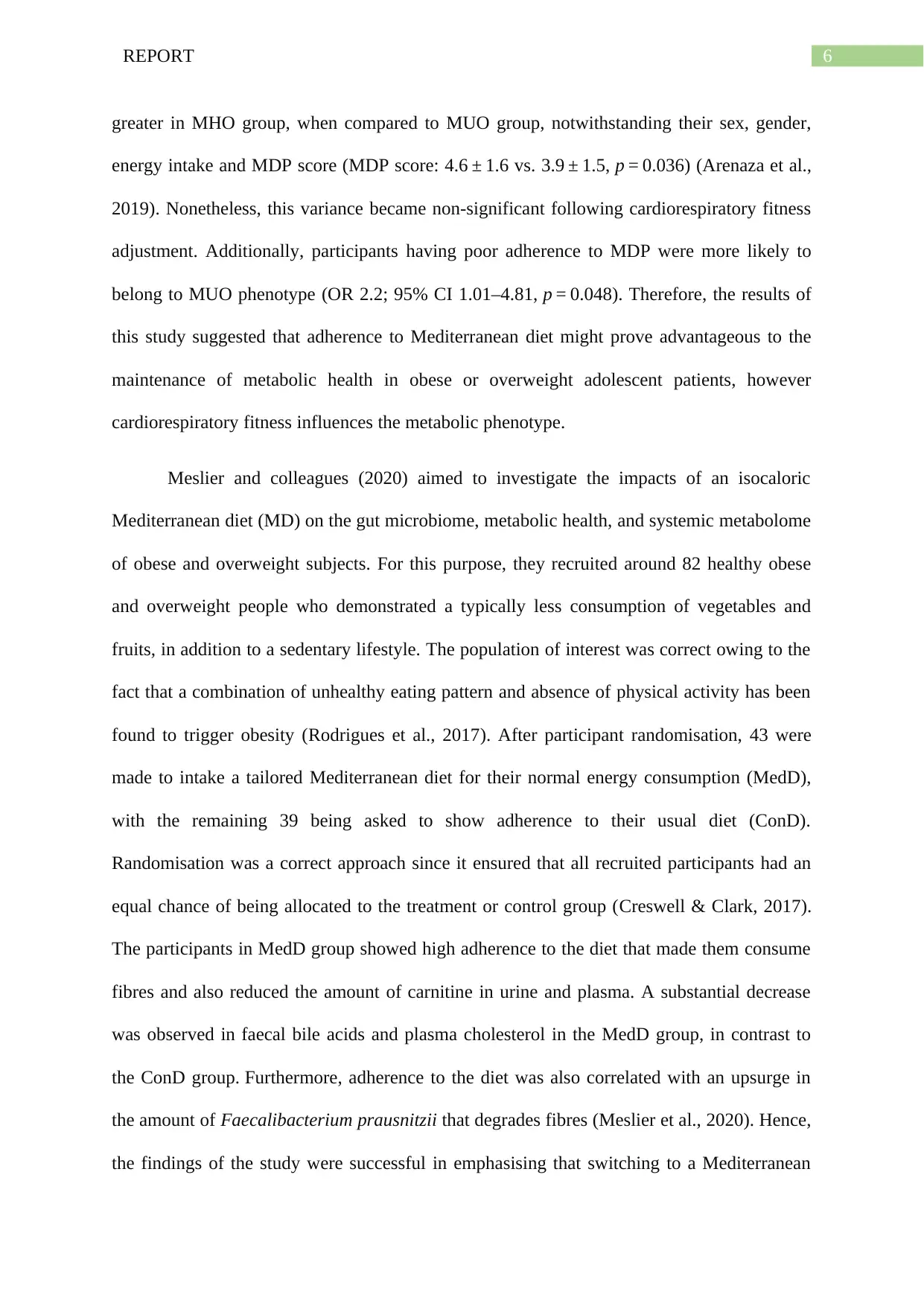
6REPORT
greater in MHO group, when compared to MUO group, notwithstanding their sex, gender,
energy intake and MDP score (MDP score: 4.6 ± 1.6 vs. 3.9 ± 1.5, p = 0.036) (Arenaza et al.,
2019). Nonetheless, this variance became non-significant following cardiorespiratory fitness
adjustment. Additionally, participants having poor adherence to MDP were more likely to
belong to MUO phenotype (OR 2.2; 95% CI 1.01–4.81, p = 0.048). Therefore, the results of
this study suggested that adherence to Mediterranean diet might prove advantageous to the
maintenance of metabolic health in obese or overweight adolescent patients, however
cardiorespiratory fitness influences the metabolic phenotype.
Meslier and colleagues (2020) aimed to investigate the impacts of an isocaloric
Mediterranean diet (MD) on the gut microbiome, metabolic health, and systemic metabolome
of obese and overweight subjects. For this purpose, they recruited around 82 healthy obese
and overweight people who demonstrated a typically less consumption of vegetables and
fruits, in addition to a sedentary lifestyle. The population of interest was correct owing to the
fact that a combination of unhealthy eating pattern and absence of physical activity has been
found to trigger obesity (Rodrigues et al., 2017). After participant randomisation, 43 were
made to intake a tailored Mediterranean diet for their normal energy consumption (MedD),
with the remaining 39 being asked to show adherence to their usual diet (ConD).
Randomisation was a correct approach since it ensured that all recruited participants had an
equal chance of being allocated to the treatment or control group (Creswell & Clark, 2017).
The participants in MedD group showed high adherence to the diet that made them consume
fibres and also reduced the amount of carnitine in urine and plasma. A substantial decrease
was observed in faecal bile acids and plasma cholesterol in the MedD group, in contrast to
the ConD group. Furthermore, adherence to the diet was also correlated with an upsurge in
the amount of Faecalibacterium prausnitzii that degrades fibres (Meslier et al., 2020). Hence,
the findings of the study were successful in emphasising that switching to a Mediterranean
greater in MHO group, when compared to MUO group, notwithstanding their sex, gender,
energy intake and MDP score (MDP score: 4.6 ± 1.6 vs. 3.9 ± 1.5, p = 0.036) (Arenaza et al.,
2019). Nonetheless, this variance became non-significant following cardiorespiratory fitness
adjustment. Additionally, participants having poor adherence to MDP were more likely to
belong to MUO phenotype (OR 2.2; 95% CI 1.01–4.81, p = 0.048). Therefore, the results of
this study suggested that adherence to Mediterranean diet might prove advantageous to the
maintenance of metabolic health in obese or overweight adolescent patients, however
cardiorespiratory fitness influences the metabolic phenotype.
Meslier and colleagues (2020) aimed to investigate the impacts of an isocaloric
Mediterranean diet (MD) on the gut microbiome, metabolic health, and systemic metabolome
of obese and overweight subjects. For this purpose, they recruited around 82 healthy obese
and overweight people who demonstrated a typically less consumption of vegetables and
fruits, in addition to a sedentary lifestyle. The population of interest was correct owing to the
fact that a combination of unhealthy eating pattern and absence of physical activity has been
found to trigger obesity (Rodrigues et al., 2017). After participant randomisation, 43 were
made to intake a tailored Mediterranean diet for their normal energy consumption (MedD),
with the remaining 39 being asked to show adherence to their usual diet (ConD).
Randomisation was a correct approach since it ensured that all recruited participants had an
equal chance of being allocated to the treatment or control group (Creswell & Clark, 2017).
The participants in MedD group showed high adherence to the diet that made them consume
fibres and also reduced the amount of carnitine in urine and plasma. A substantial decrease
was observed in faecal bile acids and plasma cholesterol in the MedD group, in contrast to
the ConD group. Furthermore, adherence to the diet was also correlated with an upsurge in
the amount of Faecalibacterium prausnitzii that degrades fibres (Meslier et al., 2020). Hence,
the findings of the study were successful in emphasising that switching to a Mediterranean
Paraphrase This Document
Need a fresh take? Get an instant paraphrase of this document with our AI Paraphraser
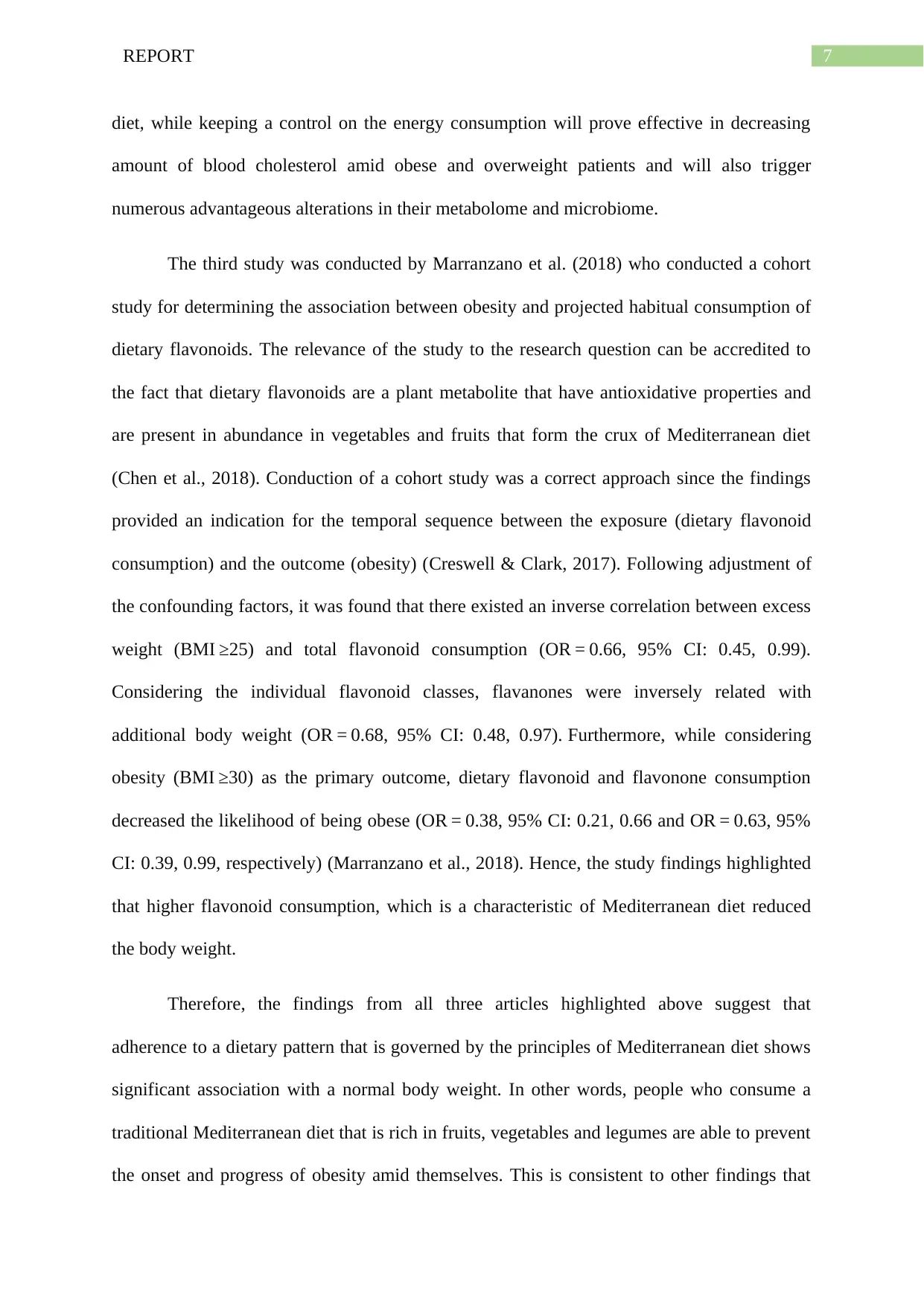
7REPORT
diet, while keeping a control on the energy consumption will prove effective in decreasing
amount of blood cholesterol amid obese and overweight patients and will also trigger
numerous advantageous alterations in their metabolome and microbiome.
The third study was conducted by Marranzano et al. (2018) who conducted a cohort
study for determining the association between obesity and projected habitual consumption of
dietary flavonoids. The relevance of the study to the research question can be accredited to
the fact that dietary flavonoids are a plant metabolite that have antioxidative properties and
are present in abundance in vegetables and fruits that form the crux of Mediterranean diet
(Chen et al., 2018). Conduction of a cohort study was a correct approach since the findings
provided an indication for the temporal sequence between the exposure (dietary flavonoid
consumption) and the outcome (obesity) (Creswell & Clark, 2017). Following adjustment of
the confounding factors, it was found that there existed an inverse correlation between excess
weight (BMI ≥25) and total flavonoid consumption (OR = 0.66, 95% CI: 0.45, 0.99).
Considering the individual flavonoid classes, flavanones were inversely related with
additional body weight (OR = 0.68, 95% CI: 0.48, 0.97). Furthermore, while considering
obesity (BMI ≥30) as the primary outcome, dietary flavonoid and flavonone consumption
decreased the likelihood of being obese (OR = 0.38, 95% CI: 0.21, 0.66 and OR = 0.63, 95%
CI: 0.39, 0.99, respectively) (Marranzano et al., 2018). Hence, the study findings highlighted
that higher flavonoid consumption, which is a characteristic of Mediterranean diet reduced
the body weight.
Therefore, the findings from all three articles highlighted above suggest that
adherence to a dietary pattern that is governed by the principles of Mediterranean diet shows
significant association with a normal body weight. In other words, people who consume a
traditional Mediterranean diet that is rich in fruits, vegetables and legumes are able to prevent
the onset and progress of obesity amid themselves. This is consistent to other findings that
diet, while keeping a control on the energy consumption will prove effective in decreasing
amount of blood cholesterol amid obese and overweight patients and will also trigger
numerous advantageous alterations in their metabolome and microbiome.
The third study was conducted by Marranzano et al. (2018) who conducted a cohort
study for determining the association between obesity and projected habitual consumption of
dietary flavonoids. The relevance of the study to the research question can be accredited to
the fact that dietary flavonoids are a plant metabolite that have antioxidative properties and
are present in abundance in vegetables and fruits that form the crux of Mediterranean diet
(Chen et al., 2018). Conduction of a cohort study was a correct approach since the findings
provided an indication for the temporal sequence between the exposure (dietary flavonoid
consumption) and the outcome (obesity) (Creswell & Clark, 2017). Following adjustment of
the confounding factors, it was found that there existed an inverse correlation between excess
weight (BMI ≥25) and total flavonoid consumption (OR = 0.66, 95% CI: 0.45, 0.99).
Considering the individual flavonoid classes, flavanones were inversely related with
additional body weight (OR = 0.68, 95% CI: 0.48, 0.97). Furthermore, while considering
obesity (BMI ≥30) as the primary outcome, dietary flavonoid and flavonone consumption
decreased the likelihood of being obese (OR = 0.38, 95% CI: 0.21, 0.66 and OR = 0.63, 95%
CI: 0.39, 0.99, respectively) (Marranzano et al., 2018). Hence, the study findings highlighted
that higher flavonoid consumption, which is a characteristic of Mediterranean diet reduced
the body weight.
Therefore, the findings from all three articles highlighted above suggest that
adherence to a dietary pattern that is governed by the principles of Mediterranean diet shows
significant association with a normal body weight. In other words, people who consume a
traditional Mediterranean diet that is rich in fruits, vegetables and legumes are able to prevent
the onset and progress of obesity amid themselves. This is consistent to other findings that
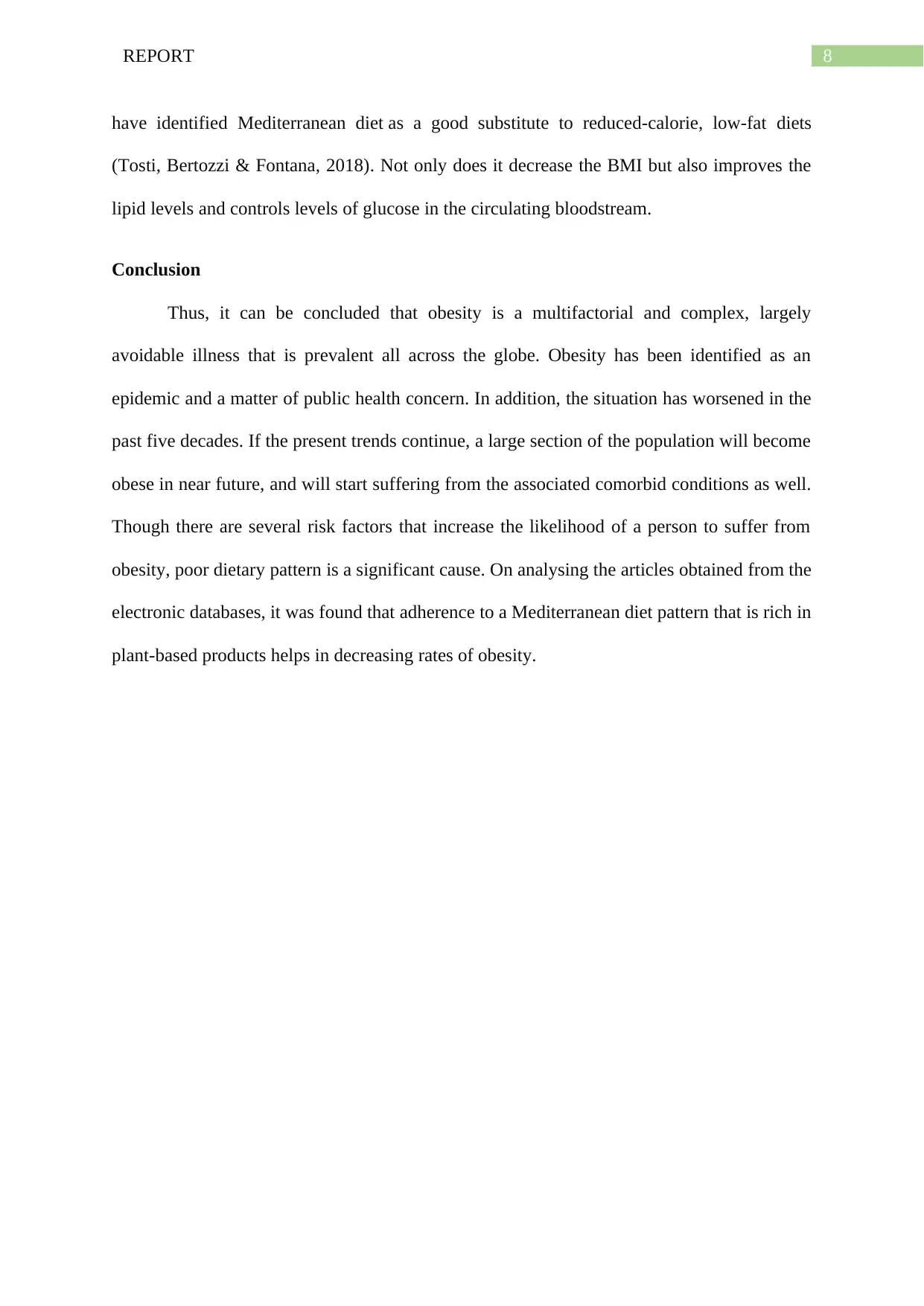
8REPORT
have identified Mediterranean diet as a good substitute to reduced-calorie, low-fat diets
(Tosti, Bertozzi & Fontana, 2018). Not only does it decrease the BMI but also improves the
lipid levels and controls levels of glucose in the circulating bloodstream.
Conclusion
Thus, it can be concluded that obesity is a multifactorial and complex, largely
avoidable illness that is prevalent all across the globe. Obesity has been identified as an
epidemic and a matter of public health concern. In addition, the situation has worsened in the
past five decades. If the present trends continue, a large section of the population will become
obese in near future, and will start suffering from the associated comorbid conditions as well.
Though there are several risk factors that increase the likelihood of a person to suffer from
obesity, poor dietary pattern is a significant cause. On analysing the articles obtained from the
electronic databases, it was found that adherence to a Mediterranean diet pattern that is rich in
plant-based products helps in decreasing rates of obesity.
have identified Mediterranean diet as a good substitute to reduced-calorie, low-fat diets
(Tosti, Bertozzi & Fontana, 2018). Not only does it decrease the BMI but also improves the
lipid levels and controls levels of glucose in the circulating bloodstream.
Conclusion
Thus, it can be concluded that obesity is a multifactorial and complex, largely
avoidable illness that is prevalent all across the globe. Obesity has been identified as an
epidemic and a matter of public health concern. In addition, the situation has worsened in the
past five decades. If the present trends continue, a large section of the population will become
obese in near future, and will start suffering from the associated comorbid conditions as well.
Though there are several risk factors that increase the likelihood of a person to suffer from
obesity, poor dietary pattern is a significant cause. On analysing the articles obtained from the
electronic databases, it was found that adherence to a Mediterranean diet pattern that is rich in
plant-based products helps in decreasing rates of obesity.
⊘ This is a preview!⊘
Do you want full access?
Subscribe today to unlock all pages.

Trusted by 1+ million students worldwide
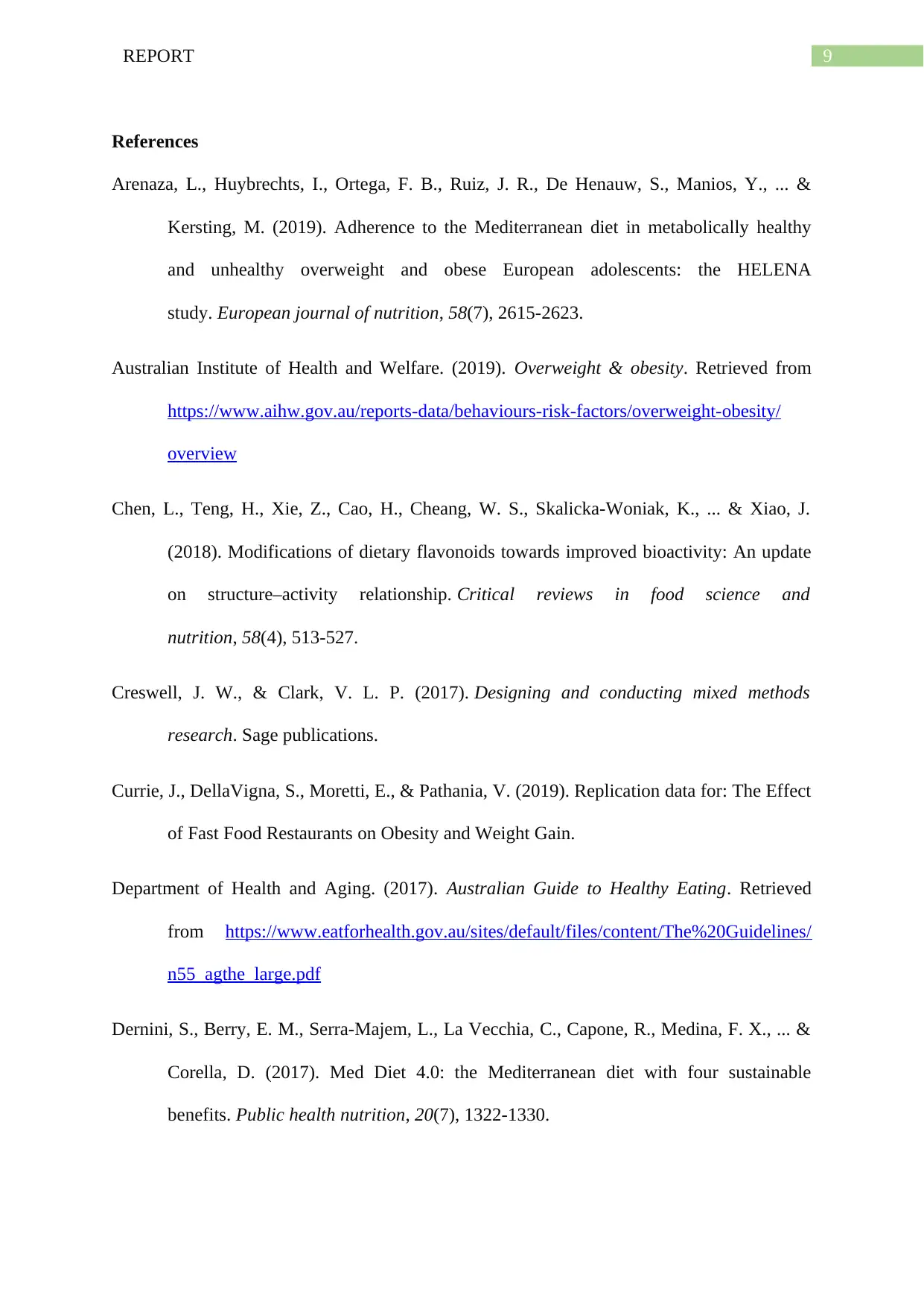
9REPORT
References
Arenaza, L., Huybrechts, I., Ortega, F. B., Ruiz, J. R., De Henauw, S., Manios, Y., ... &
Kersting, M. (2019). Adherence to the Mediterranean diet in metabolically healthy
and unhealthy overweight and obese European adolescents: the HELENA
study. European journal of nutrition, 58(7), 2615-2623.
Australian Institute of Health and Welfare. (2019). Overweight & obesity. Retrieved from
https://www.aihw.gov.au/reports-data/behaviours-risk-factors/overweight-obesity/
overview
Chen, L., Teng, H., Xie, Z., Cao, H., Cheang, W. S., Skalicka-Woniak, K., ... & Xiao, J.
(2018). Modifications of dietary flavonoids towards improved bioactivity: An update
on structure–activity relationship. Critical reviews in food science and
nutrition, 58(4), 513-527.
Creswell, J. W., & Clark, V. L. P. (2017). Designing and conducting mixed methods
research. Sage publications.
Currie, J., DellaVigna, S., Moretti, E., & Pathania, V. (2019). Replication data for: The Effect
of Fast Food Restaurants on Obesity and Weight Gain.
Department of Health and Aging. (2017). Australian Guide to Healthy Eating. Retrieved
from https://www.eatforhealth.gov.au/sites/default/files/content/The%20Guidelines/
n55_agthe_large.pdf
Dernini, S., Berry, E. M., Serra-Majem, L., La Vecchia, C., Capone, R., Medina, F. X., ... &
Corella, D. (2017). Med Diet 4.0: the Mediterranean diet with four sustainable
benefits. Public health nutrition, 20(7), 1322-1330.
References
Arenaza, L., Huybrechts, I., Ortega, F. B., Ruiz, J. R., De Henauw, S., Manios, Y., ... &
Kersting, M. (2019). Adherence to the Mediterranean diet in metabolically healthy
and unhealthy overweight and obese European adolescents: the HELENA
study. European journal of nutrition, 58(7), 2615-2623.
Australian Institute of Health and Welfare. (2019). Overweight & obesity. Retrieved from
https://www.aihw.gov.au/reports-data/behaviours-risk-factors/overweight-obesity/
overview
Chen, L., Teng, H., Xie, Z., Cao, H., Cheang, W. S., Skalicka-Woniak, K., ... & Xiao, J.
(2018). Modifications of dietary flavonoids towards improved bioactivity: An update
on structure–activity relationship. Critical reviews in food science and
nutrition, 58(4), 513-527.
Creswell, J. W., & Clark, V. L. P. (2017). Designing and conducting mixed methods
research. Sage publications.
Currie, J., DellaVigna, S., Moretti, E., & Pathania, V. (2019). Replication data for: The Effect
of Fast Food Restaurants on Obesity and Weight Gain.
Department of Health and Aging. (2017). Australian Guide to Healthy Eating. Retrieved
from https://www.eatforhealth.gov.au/sites/default/files/content/The%20Guidelines/
n55_agthe_large.pdf
Dernini, S., Berry, E. M., Serra-Majem, L., La Vecchia, C., Capone, R., Medina, F. X., ... &
Corella, D. (2017). Med Diet 4.0: the Mediterranean diet with four sustainable
benefits. Public health nutrition, 20(7), 1322-1330.
Paraphrase This Document
Need a fresh take? Get an instant paraphrase of this document with our AI Paraphraser
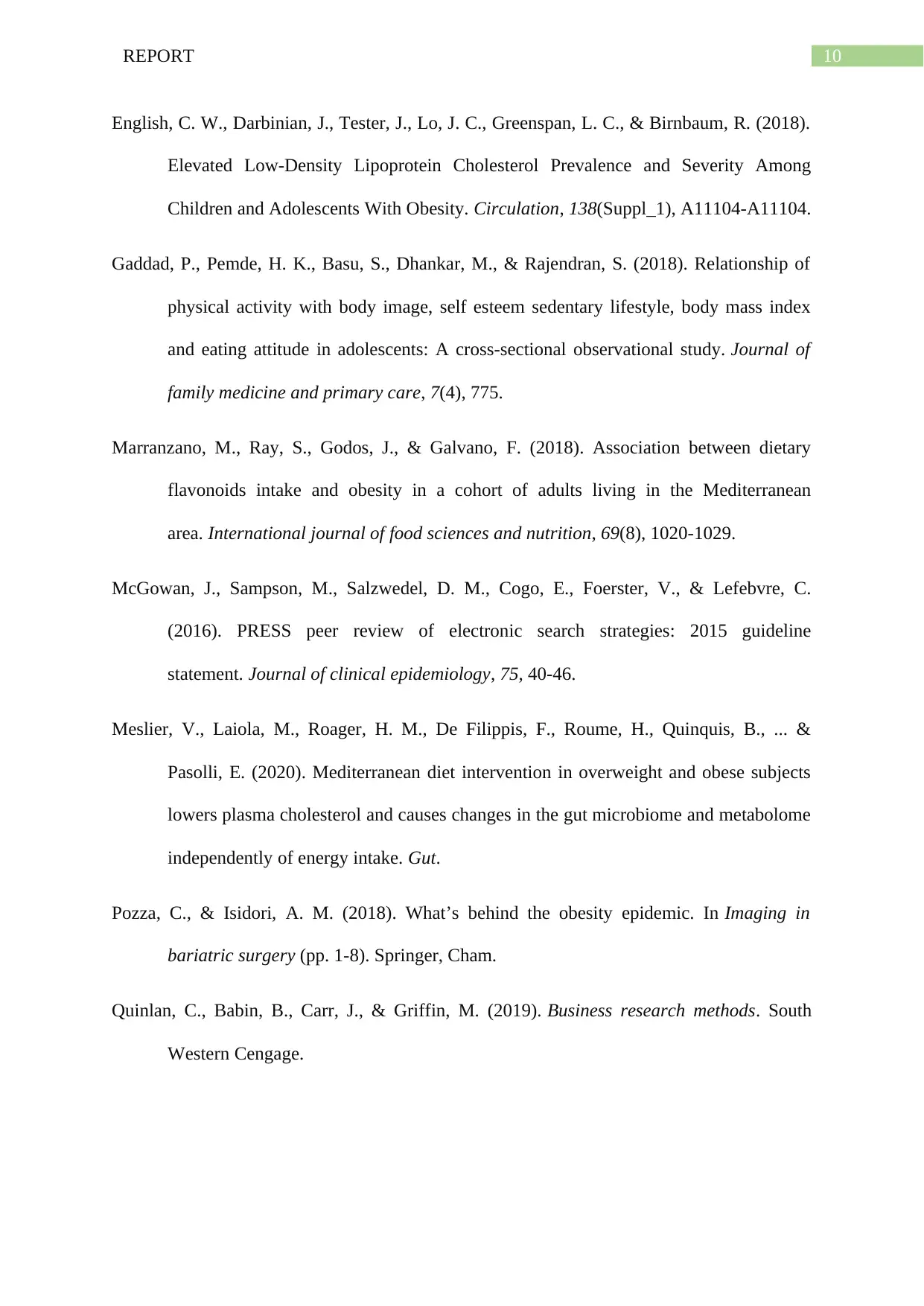
10REPORT
English, C. W., Darbinian, J., Tester, J., Lo, J. C., Greenspan, L. C., & Birnbaum, R. (2018).
Elevated Low-Density Lipoprotein Cholesterol Prevalence and Severity Among
Children and Adolescents With Obesity. Circulation, 138(Suppl_1), A11104-A11104.
Gaddad, P., Pemde, H. K., Basu, S., Dhankar, M., & Rajendran, S. (2018). Relationship of
physical activity with body image, self esteem sedentary lifestyle, body mass index
and eating attitude in adolescents: A cross-sectional observational study. Journal of
family medicine and primary care, 7(4), 775.
Marranzano, M., Ray, S., Godos, J., & Galvano, F. (2018). Association between dietary
flavonoids intake and obesity in a cohort of adults living in the Mediterranean
area. International journal of food sciences and nutrition, 69(8), 1020-1029.
McGowan, J., Sampson, M., Salzwedel, D. M., Cogo, E., Foerster, V., & Lefebvre, C.
(2016). PRESS peer review of electronic search strategies: 2015 guideline
statement. Journal of clinical epidemiology, 75, 40-46.
Meslier, V., Laiola, M., Roager, H. M., De Filippis, F., Roume, H., Quinquis, B., ... &
Pasolli, E. (2020). Mediterranean diet intervention in overweight and obese subjects
lowers plasma cholesterol and causes changes in the gut microbiome and metabolome
independently of energy intake. Gut.
Pozza, C., & Isidori, A. M. (2018). What’s behind the obesity epidemic. In Imaging in
bariatric surgery (pp. 1-8). Springer, Cham.
Quinlan, C., Babin, B., Carr, J., & Griffin, M. (2019). Business research methods. South
Western Cengage.
English, C. W., Darbinian, J., Tester, J., Lo, J. C., Greenspan, L. C., & Birnbaum, R. (2018).
Elevated Low-Density Lipoprotein Cholesterol Prevalence and Severity Among
Children and Adolescents With Obesity. Circulation, 138(Suppl_1), A11104-A11104.
Gaddad, P., Pemde, H. K., Basu, S., Dhankar, M., & Rajendran, S. (2018). Relationship of
physical activity with body image, self esteem sedentary lifestyle, body mass index
and eating attitude in adolescents: A cross-sectional observational study. Journal of
family medicine and primary care, 7(4), 775.
Marranzano, M., Ray, S., Godos, J., & Galvano, F. (2018). Association between dietary
flavonoids intake and obesity in a cohort of adults living in the Mediterranean
area. International journal of food sciences and nutrition, 69(8), 1020-1029.
McGowan, J., Sampson, M., Salzwedel, D. M., Cogo, E., Foerster, V., & Lefebvre, C.
(2016). PRESS peer review of electronic search strategies: 2015 guideline
statement. Journal of clinical epidemiology, 75, 40-46.
Meslier, V., Laiola, M., Roager, H. M., De Filippis, F., Roume, H., Quinquis, B., ... &
Pasolli, E. (2020). Mediterranean diet intervention in overweight and obese subjects
lowers plasma cholesterol and causes changes in the gut microbiome and metabolome
independently of energy intake. Gut.
Pozza, C., & Isidori, A. M. (2018). What’s behind the obesity epidemic. In Imaging in
bariatric surgery (pp. 1-8). Springer, Cham.
Quinlan, C., Babin, B., Carr, J., & Griffin, M. (2019). Business research methods. South
Western Cengage.
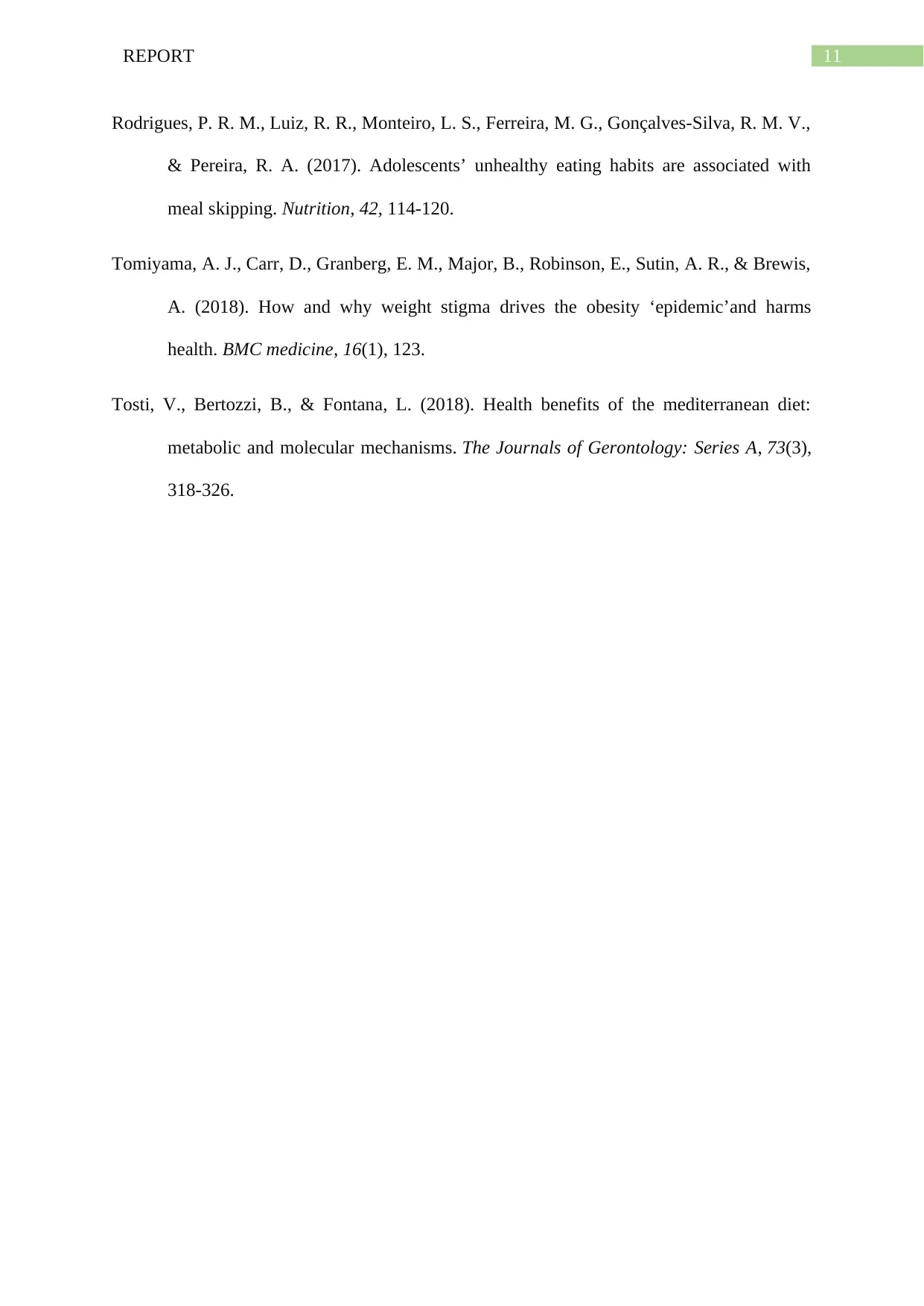
11REPORT
Rodrigues, P. R. M., Luiz, R. R., Monteiro, L. S., Ferreira, M. G., Gonçalves-Silva, R. M. V.,
& Pereira, R. A. (2017). Adolescents’ unhealthy eating habits are associated with
meal skipping. Nutrition, 42, 114-120.
Tomiyama, A. J., Carr, D., Granberg, E. M., Major, B., Robinson, E., Sutin, A. R., & Brewis,
A. (2018). How and why weight stigma drives the obesity ‘epidemic’and harms
health. BMC medicine, 16(1), 123.
Tosti, V., Bertozzi, B., & Fontana, L. (2018). Health benefits of the mediterranean diet:
metabolic and molecular mechanisms. The Journals of Gerontology: Series A, 73(3),
318-326.
Rodrigues, P. R. M., Luiz, R. R., Monteiro, L. S., Ferreira, M. G., Gonçalves-Silva, R. M. V.,
& Pereira, R. A. (2017). Adolescents’ unhealthy eating habits are associated with
meal skipping. Nutrition, 42, 114-120.
Tomiyama, A. J., Carr, D., Granberg, E. M., Major, B., Robinson, E., Sutin, A. R., & Brewis,
A. (2018). How and why weight stigma drives the obesity ‘epidemic’and harms
health. BMC medicine, 16(1), 123.
Tosti, V., Bertozzi, B., & Fontana, L. (2018). Health benefits of the mediterranean diet:
metabolic and molecular mechanisms. The Journals of Gerontology: Series A, 73(3),
318-326.
⊘ This is a preview!⊘
Do you want full access?
Subscribe today to unlock all pages.

Trusted by 1+ million students worldwide
1 out of 12
Related Documents
Your All-in-One AI-Powered Toolkit for Academic Success.
+13062052269
info@desklib.com
Available 24*7 on WhatsApp / Email
![[object Object]](/_next/static/media/star-bottom.7253800d.svg)
Unlock your academic potential
Copyright © 2020–2026 A2Z Services. All Rights Reserved. Developed and managed by ZUCOL.





